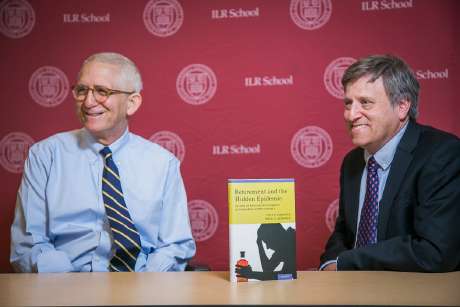Book details epidemic of alcohol abuse among retirees

After studying 1,100 retirement-age blue collar workers, Peter Bamberger urges Baby Boomers to "anticipate things happening unexpectedly so that you are more psychologically prepared … if you're pushed out [of a job] … especially if you like your job."
His new book, "Retirement and the Hidden Epidemic: The Complex Link Between Aging, Work Disengagement and Substance Misuse – and What To Do About It" (Oxford University Press), presents findings he hopes will provide an intervention framework for employers, policymakers, psychologists and others.
Bamberger, senior research scholar at Cornell's Smithers Institute for Alcohol-Related Workplace Studies, co-authored the book with ILR's McKelvey-Grant Professor Sam Bacharach, director of the Smithers Institute, after a 10-year study funded by the National Institutes of Health.
The authors discussed findings Oct. 20 at the ILR New York City Conference Center that they hope will heighten awareness of retiree vulnerability to alcohol misuse.
"If you can kill the stigma, there's hope. This research points to that possibility," said Bamberger, professor of organizational behavior at the Recanati Graduate School of Business Administration, Tel Aviv University.
An estimated 10 to 17 percent of Americans ages 65 and older misuse alcohol, according to research the authors cite. The loss of structure, identity, peer networks and other factors in retirement complicate vulnerability to alcohol, along with aging bodies that intensify alcohol's impact, they said.
"It's not surprising they're looking for some way to self-medicate," Bamberger said. "Alcohol misuse by retirees is more complex than people think."
It also underscores, Bacharach said, "that vulnerability doesn't disappear, it continues through life. We have to be more sensitive to who we are."
"The good news is that people are looking into" alcohol misuse by retirees, he said, "and maybe that's the first step" in institutionalizing pre-retirement screening and other steps to prevent misuse.
Retirement is often experienced as a process in which "retirees" move in and out of the labor force, working full- or part-time, changing careers or starting their own businesses. Many move back into the labor force after retiring – a trend known as "bridge employment."
Substance misuse by older adults drives up health care and social welfare costs for employers and for society, they said, recommending a three-pronged approach: include bridge employees, often part-time workers, in health and wellness efforts offered to other workers; assist with retirement planning; and encourage formation of workplace alumni networks.
Bridge employees are often part-timers and "fly under the radar" of substance abuse identification, the authors said. They suggest that employers:
- provide education and information about where to seek help;
- offer substance misuse screenings before and after retirement;
- establish a network of peer counselors to facilitate help-seeking;
- educate employees ready to retire about risk factors; and
- leverage workplace alumni networks as information sources about risk factors.
Other findings by Bamberger and Bacharach include:
- alcohol consumption quantity is higher for bridge retirees than for full retirees;
- the risk of binge drinking doubles for those who fully retire versus those deferring retirement;
- those who are pushed into retirement drink more frequently, particularly if they were satisfied with their pre-retirement job;
- for those with histories of heavy drinking, retirement resulted in decline in severity of problem drinking;
- for younger aging workers, retirement is associated with a significantly higher risk of drug misuse relative to those who defer retirement; and
- for older aging workers, deferring retirement is associated with higher risk of drug misuse relative to those who retire.














